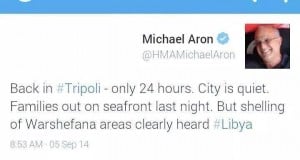By Sami Zaptia.
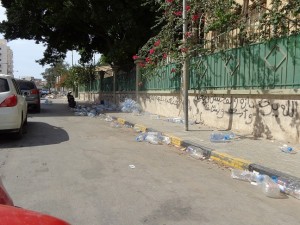
Tripoli, 9 September 2014:
Sunday 7 September, was supposed to be a key date in Tripoli’s, and therefore Libya’s, attempt . . .[restrict]to get back to some sort of normality. It was the day that at least some schools, including some private schools, had made an attempt to start the new academic year.
Back to School..?
Getting schools started and getting school goers and their parents into the daily school routines could be one of the biggest moves into getting Tripoli back to normal.
However, it is not as straight forward and simple as that. Many Libyan families, who at least can afford it, are still seeking refuge abroad and have not returned home to send their children to school.
Some Libyans who are still within Libya, but are displaced because of the fighting are still choosing not to send their children to schools in their new locations. This, despite the fact that the Ministry of Education has said that any students will be accepted in the nearest school to wherever they are currently living – even if it is not their normal permanent area of residence. The view is that they expect to return to their permanent homes soon – so they choose to wait.
More complicated than that is the role and view of some teachers and school heads. Like everything about the dichotomous new post February 17 democratic Libya, some schools are, sadly, split into pro the House of Representatives (HoR) and anti HoR.
At least one school in Hay Demashque near Libya Herald’s office is refusing to start the new school year “until the new government is formed and a new Minister of Education is approved by the HoR”. Next to this school is a school whose head hails from one of the cities that is anti HoR. The head there has been trying to start the school, but it seems the majority of his staff and students were unwilling to return to school Sunday.
There are some parents and teachers who are still finding difficulty in obtaining fuel for their cars and who are either unable or unwilling to queue for long hours (3-4) at petrol stations in order to obtain fuel. TIt seems that they have made the strategic decision to conserve their limited fuel supply rather than expend it on school trips.
While no doubt some families are still apprehensive about the situation in Tripoli and about returning to the city and sending their children off to school, it is also fair to report that some students and their parents are simply taking advantage of the current situation and the lack of a strong central authority and the atmosphere of uncertainty by just simply not bothering and playing truant.
Both the ISM (former Oil Company School) and Filipino school in Tripoli have announced upcoming dates for start of term. Some other private Arabic language schools opened on Sunday, but it is reported that turnout is less than 50 percent.
Security
There is no fighting in (the official boundaries of) Tripoli, but as the visiting British ambassador confirmed in a tweet a few days ago, fighting in the greater Wershafana areas, including the borders of Zawia and Janzour, can still be heard from Tripoli.
The fighting was also independently confirmed by GECOL on Saturday, which posted on its Facebook page attributing the power cuts in western Tripoli to the damage to its power station/assets caused by fighting in Zawia.
Ad hoc reports of armed crime and carjackings seem to have decreased in Tripoli generally and especially in the formerly high crime outlying areas of Airport road, Swani and Kremia. Although this could partly be the result of decreased residents there and decreased traffic in the areas to be carjacked.
Driving to Swani road, Kremia road and Airport road, things are calm and very quiet. Tripoli Council was cleaning the roadsides. This is a drive this writer does every other day. The overwhelming majority of shops, commercial and industrial outlets are still closed. At best 20-30 percent are open along the usually bumper to bumper Swani and Kremia roads.
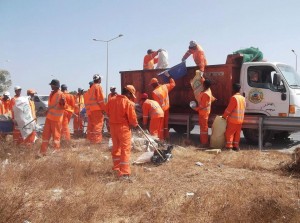
This is one of the main light industrial areas of Tripoli supplying tools, equipment, cars, spare parts, heavy lifting equipment, generators, electrical equipment etc. If indeed only an estimated third are open, this is a good indicator of the level of “normality” that Tripoli is currently at – or not at.
The wholesale market road known as Samba road has reopened. The closure of this road alone during the fighting had caused some food shortages as it acts as Tripoli’s, and therefore Libya’s, main source of wholesale food supply.
There are militia check points along Airport, Swani and Kremia roads, stopping mainly trucks and cars driven by youth and checking car ownership and inspecting the car boot (trunk) for weapons.
Petrol, diesel and cooking gas
One of the biggest indicators of the state of normality in Tripoli is the state of its fuel and cooking gas supply. The destruction of Tripoli’s main fuel depot has meant that petrol, diesel and cooking gas has had to be brought in by tankers and offloaded at Tripoli port.
Cooking gas is still in short supply, although Brega has actually started repairing its gas cylinder filling line at the obliterated Airport road Fuel Depot. It is not clear how long it will take to bring it to its former full capacity.
Petrol queues still exist and approximately a third of Tripoli’s petrol stations are operating. On average, it is taking 2-4 hours to fill a car tank in the two petrol station nearest Libya Herald’s office.
Power and internet cuts
The depressing and wearying Tripoli wide power cuts continue intermittently and unannounced. They vary from area to area and from week to week. This week in the area where Libya Herald is located, they have ranged from 4-6 hours. Other areas have had nine and twelve hours.
Stating the obvious, power cuts, and especially in the evening, mean that there is no light, no internet and no television, adding to the doom and gloom and general state of depression that Tripolitanians have been experiencing for nearly two months.
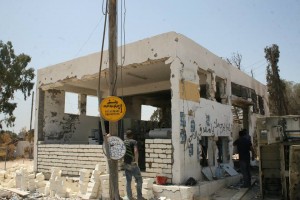
The power cuts affect the internet antennas located on top of buildings so that even if there is power in the area a person is living in, internet transmission is lost or very weak due to a power cut in the surrounding areas where the antennas are located.
Water supply
Tripoli’s water supply, or lack of it, has been closely linked to the fighting and power cuts. On Friday the city’s water supply disappeared again, all be it for just a day. The Ministry of Water Resources attributed it to power supply cuts at its pumping stations. As long as power cuts continue there will always be a probability of water cuts.
Power generators
Many Tripolitanians who can afford it have invested in electric generators. Unsurprisingly their prices have gone up and supply and choice has decreased. Generators need a steady supply of fuel, which their owners, of course, have to queue for.
Nevertheless, the overwhelming majority of Tripolitanians do not own electric generators and when there is a major power cut huge parts of Tripoli are plunged into total darkness.
Traffic
Another obvious indicator of the state of life in Tripoli is its bumper to bumper traffic. In the Tripoli that preceded the July fighting, all of Tripoli was one huge traffic jam – including the Airport road traffic lights, Swani and Kremia roads.
Traffic has been increasing every week since the end of fighting and the relative increased availability of petrol. However, the increased traffic is relative and is at best half of the normal traffic.
Libya Herald has been driving through Tripoli over the last three days, taking in Hay Demashque, Al-Hadba road, Al-Hadba Hospital, Bu Sleem market, Bab Ben Ghasheer, Bab Aziziya roudabout, Al Quds roundabout, Abu Mishmasha, Jumhuriya Street, Ben Ashour, Jraba Street, Ras Hassan traffic light, Sidi Masri roundabout, Zawia street, the main (Zawia St.) post office and Soor Street, Hay Al-Andulous, Girgarish, Siyahiya, Airport road, Swani road and Kremia.
There was definitely increased traffic compared to previous weeks, and there were a number of traffic jams at traffic lights with power cuts. However, traffic could not be called normal and at best could be put at 50 percent.
Shops
Shops are starting to open up, more in hope of business rather than of expectation – and probably out of boredom than anything else. Food and vegetable shops have never had any problems with customers. Dry cleaners, chemists as well as clinics are open too.
However, only selective domestic goods and appliance shops and clothes shops are open. There are some exceptions with on balance more shops in central areas such as 24 December Street, Wadi Street, Magarief Street, Baladia Street, Dahra, Jraba Street and Ben Ashour open.
This morning, Libya Herald was able to drive all the way from Hay Al-Andulous, Girgarish and up to the British Council turning in Siyahiya in about 20 minutes. It was eerie. A drive like that would need the better part of an hour usually on a Tuesday mid morning. Traffic was at best 50 per cent of usual and most shops were closed. Indeed most traffic was caused by the banks. The Stock market was closed and only one petrol station was open at 11.15 along the Hay Andulous-Siyahiya stretch.
For example, Debenhams, BHS, M&S, Cafe di Roma and Veranda were open. Probably most cafes were open and it looked as if they at least were busy.
Fish market
The fish market on Monday was open and life was beginning to return to it – operating at about 60 percent capacity. Prices were slightly up on some types of fish, but there was a wide variety on offer.
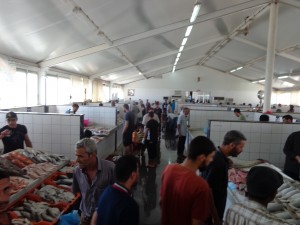
Bread
Another good indicator of normality is the availability of bread. Bread queues have decreased, but not completely disappeared, as more and more bakeries reopen and more migrant workers return to work in them. However, many bakeries are still closed. However bread is more readily available in shops now.
Banks
The state owned banks continue to put out calls for their employees to return to work. Some employees are displaced, some are unable to get a regular supply of fuel, but others are just avoiding work. Libya Herald visited two Wahda banks on Sunday which had huge queues. There was also a huge queue at the Bab Ben Ghasheer Jumhuriya bank branch which snaked all the way out of the shopping precinct to the main street.
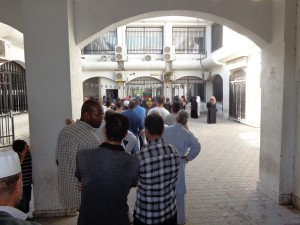
The privately owned banks seem to be operating better. Libya Herald visited two branches of the Bank of Commerce and Development that had been closed during the fighting. They had normal queues and seemed to be operating normally. The privately owned Aman bank is still not accepting cash deposits due to the security situation.
Still an air of uncertainty?
With two Prime Ministers, two governments and two parliaments, many Tripolitanians see this calm in their city more as a pause, a false calm, with the political and military air still full of much uncertainty.
Some see this calm as the calm before the expected storm. Many are not confident Tripoli has seen the end of the fighting, and the bangs in the distant areas of Wershafana are a constant reminder of that possibility.
With no political settlement seemingly on the horizon, many see the causes of the fighting still in existence, and therefore see no logical reason to believe that there will be no more fighting soon.
The ultimate proof is that Tripolitanians are voting with their feet – by continuing to choose to be out of Tripoli, either in its surrounding cities or outside Libya all together. Some interpret this refusal to return to Tripoli and to normal life as fear of the unknown whilst others see it as a political protest against the destruction and “invasion of Tripoli”.
Whatever the real reasons are, the facts speak for themselves. The majority of closed shops, empty schools and empty roads are a testimony to how Tripolitanians see the situation. The non returning foreign companies and their expat employees, as well as the continued closure of embassies, are further international evidence of Tripoli’s incomplete return to normality.
[/restrict]



